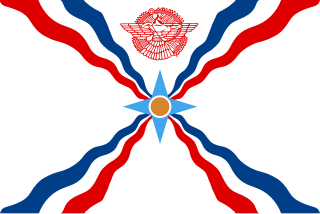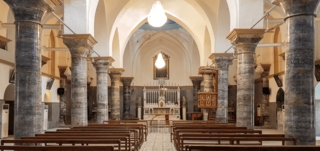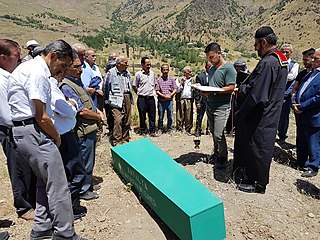Related Research Articles

Assyrians are an indigenous ethnic group native to Mesopotamia, a geographical region in West Asia. Modern Assyrians descend from Ancient Mesopotamians such as ancient Assyrians and Babylonians, originating from the ancient indigenous Mesopotamians of Akkad and Sumer, who first developed the civilisation in northern Mesopotamia that would become Assyria in 2600 BCE. Modern Assyrians may culturally self-identify as Syriacs, Chaldeans, or Arameans for religious, geographic, and tribal identification.

The Chaldean Catholic Church is an Eastern Catholic particular church in full communion with the Holy See and the rest of the Catholic Church, and is headed by the Chaldean Patriarchate. Employing in its liturgy the East Syriac Rite in the Syriac dialect of the Aramaic language, it is part of Syriac Christianity. Headquartered in the Cathedral of Our Lady of Sorrows, Baghdad, Iraq, since 1950, it is headed by the Catholicos-Patriarch Louis Raphaël I Sako. In 2010, it had a membership of 490,371, of whom 310,235 (63.27%) lived in the Middle East.

The Assyrian diaspora refers to ethnic Assyrians living in communities outside their ancestral homeland. The Eastern Aramaic-speaking Assyrians claim descent from the ancient Assyrians and are one of the few ancient Semitic ethnicities in the Near East who resisted Arabization, Turkification, Persianization and Islamization during and after the Muslim conquest of Iraq, Iran, Syria and Turkey.

Iraqi Assyrians are an ethnic and linguistic minority group, indigenous to Upper Mesopotamia. Assyrians in Iraq are those Assyrians still residing in the country of Iraq, and those in the Assyrian diaspora who are of Iraqi-Assyrian heritage. They share a common history and ethnic identity, rooted in shared linguistic, cultural and religious traditions, with Assyrians in Iran, Assyrians in Turkey and Assyrians in Syria, as well as with the Assyrian diaspora. Assyrian diaspora in Detroit, Areas with large expat populations include Chicago and Sydney.

Assyrians in Iran, or Iranian Assyrians, are an ethnic and linguistic minority in present-day Iran. The Assyrians of Iran speak Assyrian Neo-Aramaic, a neo-Aramaic language descended from Classical Syriac and elements of Akkadian, and are Eastern Rite Christians belonging mostly to the Assyrian Church of the East and also to the Ancient Church of the East, Assyrian Pentecostal Church, Chaldean Catholic Church and Assyrian Evangelical Church.

Assyrians in Syria also known as Syriacs are an ethnic and linguistic minority that are indigenous to Upper Mesopotamia, the north-eastern half of Syria. Syrian-Assyrians are people of Assyrian descent living in Syria, and those in the Assyrian diaspora who are of Syrian-Assyrian heritage.

Assyrians in Turkey or Turkish Assyrians are an indigenous Semitic-speaking ethnic group and minority of Turkey who are Eastern Aramaic–speaking Christians, with most being members of the Syriac Orthodox Church, Chaldean Catholic Church, Assyrian Pentecostal Church, Assyrian Evangelical Church, or Ancient Church of the East.
Assyrian Americans refers to individuals of ethnic Assyrian ancestry born in or residing within the United States. Assyrians are an indigenous Middle Eastern ethnic group native to Mesopotamia in West Asia who descend from their ancient counterparts, directly originating from the ancient indigenous Mesopotamians of Akkad and Sumer who first developed the independent civilization in northern Mesopotamia that would become Assyria in 2600 BC. Modern Assyrians often culturally self-identify as Syriacs, Chaldeans, or Arameans for religious and tribal identification. The first significant wave of Assyrian immigration to the United States was due to the Sayfo genocide in the Assyrian homeland in 1914–1924.
Iraqi Americans are American citizens of Iraqi descent. As of 2015, the number of Iraqi Americans is around 145,279, according to the United States Census Bureau.

Assyrian Australians, refers to ethnic Assyrians possessing Australian nationality. They are descended from the Northern Mesopotamian region, specifically the Assyrian homeland. Today, their homeland is a part of North Iraq, Southeast Turkey, Northwest Iran and Northeast Syria.

The Christians of Iraq are considered to be one of the oldest continuous Christian communities in the world.

Chaldean Catholics, also known as Chaldeans, Chaldo-Assyrians or Assyro-Chaldeans, are ethnic Assyrian adherents of the Chaldean Catholic Church, which originates from the historic Church of the East.

Assyrians in Lebanon or Assyrian Lebanese, are people of Assyrian descent living in Lebanon. It is estimated that there are approximately 30,000 Assyrians currently residing in Lebanon, primarily in Beirut and Zahlé. This number includes the descendants of Assyrian genocide survivors who fled Iraq, Turkey, and Iran between 1915-1934.

Terms for Syriac Christians are endonymic (native) and exonymic (foreign) terms, that are used as designations for Syriac Christians, as adherents of Syriac Christianity. In its widest scope, Syriac Christianity encompass all Christian denominations that follow East Syriac Rite or West Syriac Rite, and thus use Classical Syriac as their main liturgical language. Traditional divisions among Syriac Christians along denominational lines are reflected in the use of various theological and ecclesiological designations, both historical and modern. Specific terms such as: Jacobites, Saint Thomas Syrian Christians, Maronites, Melkites, Nasranis, and Nestorians have been used in reference to distinctive groups and branches of Eastern Christianity, including those of Syriac liturgical and linguistic traditions. Some of those terms are polysemic, and their uses have been a subject of terminological disputes between different communities, and also among scholars.

Assyrian nationalism is a movement of the Assyrian people that advocates for independence or autonomy within the regions they inhabit in northern Iraq, northeastern Syria, northwestern Iran, and southeastern Turkey.
Iraqi New Zealanders constitute a small population immigrants from Iraq and New Zealand-born people of Iraqi heritage or descent.

Christianity, which originated in the Middle East during the 1st century AD, is a significant minority religion within the region, characterized by the diversity of its beliefs and traditions, compared to Christianity in other parts of the Old World. Christians now make up approximately 5% of the Middle Eastern population, down from 13% in the early 20th century. Cyprus is the only Christian majority country in the Middle East, with Christians forming between 76% and 78% of the country's total population, most of them adhering to Eastern Orthodox Christianity. Lebanon has the second highest proportion of Christians in the Middle East, around 40%, predominantly Maronites. Egypt has the next largest proportion of Christians, at around 10% of its total population. Copts, numbering around 10 million, constitute the single largest Christian community in the Middle East.

The Last Assyrians is a 2004 French documentary film by Robert Alaux.
This is a list of Assyrian populations by country according to official and estimated numbers. Due to a lack of official data in many countries, estimates may vary.

The Catholic Church in the Middle East is under the spiritual leadership of the Pope in Rome. The Catholic Church is said to have traditionally originated in the Middle East in the 1st century AD, and was one of the major religions of the region from the 4th-century Byzantine reforms until the centuries following the Arab Islamic conquests of the 7th century AD. Ever since, its proportion has decreased until today's diaspora tendency, mainly due to persecution by Islamic majority societies. In most Islamic countries, the Catholic Church is severely restricted or outlawed. Significant exceptions include Israel and Lebanon.
References
- ↑ "2013 Census ethnic group profiles: Assyrian". Stats NZ. Archived from the original on 24 December 2018. Retrieved 18 June 2019.
- ↑ Wright, Tony. "Memorial unveiled for 'martyr' Kiwi WWI soldiers who fought against Armenian Genocide". Newshub. Retrieved 18 June 2019.
- ↑ Yalda, Ashoor. "New Zealand Primary School Adds Assyrian New Year to Curriculum". AINA. Retrieved 18 June 2019.
- ↑ "2013 Census ethnic group profiles: Assyrian". Stats NZ. Archived from the original on 24 December 2018. Retrieved 18 June 2019.


